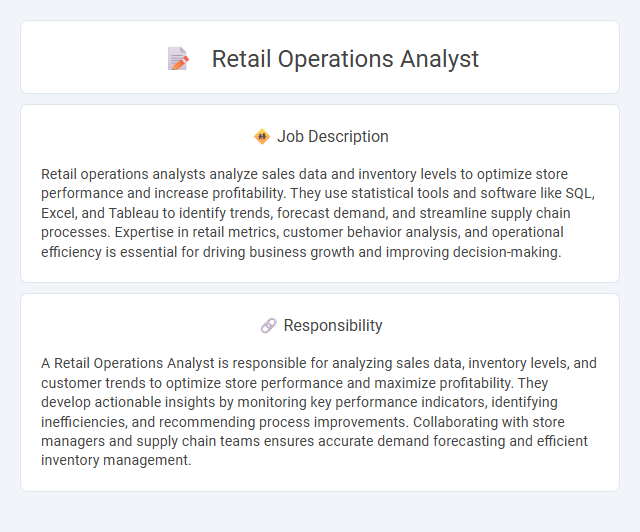
Retail operations analysts analyze sales data and inventory levels to optimize store performance and increase profitability. They use statistical tools and software like SQL, Excel, and Tableau to identify trends, forecast demand, and streamline supply chain processes. Expertise in retail metrics, customer behavior analysis, and operational efficiency is essential for driving business growth and improving decision-making.
Candidates with strong analytical skills and a keen attention to detail are more likely to thrive in a Retail Operations Analyst role. Those comfortable working with large data sets and interpreting sales trends may find the job suitable, while individuals who prefer less quantitative or routine tasks might struggle. The position probably suits people who enjoy problem-solving and collaborating with cross-functional teams to improve retail performance.
Qualification
A Retail Operations Analyst typically requires a bachelor's degree in business, economics, or a related field, alongside strong proficiency in data analysis tools such as Excel, SQL, and BI software. Experience with retail metrics, inventory management, and sales forecasting is essential, combined with analytical thinking and problem-solving skills. Knowledge of market trends and supply chain logistics enhances the ability to optimize store performance and drive operational efficiency.
Responsibility
A Retail Operations Analyst is responsible for analyzing sales data, inventory levels, and customer trends to optimize store performance and maximize profitability. They develop actionable insights by monitoring key performance indicators, identifying inefficiencies, and recommending process improvements. Collaborating with store managers and supply chain teams ensures accurate demand forecasting and efficient inventory management.
Benefit
A Retail Operations Analyst position likely offers significant benefits including enhanced data-driven decision-making skills and improved operational efficiency in retail environments. Candidates may experience career growth opportunities by gaining expertise in analytics tools and retail performance metrics. The role probably provides exposure to cross-functional teams, fostering collaboration and strategic insights into retail business operations.
Challenge
Retail operations analyst roles likely involve complex data management challenges due to the vast amount of sales, inventory, and customer behavior information. Navigating discrepancies in data sources may require strong analytical skills and attention to detail to ensure accurate reporting. Balancing the need for quick insights with thorough data validation could create ongoing pressure in fast-paced retail environments.
Career Advancement
Retail operations analysts leverage data analytics to improve store performance, inventory management, and customer experience, creating pathways for career advancement into managerial roles such as retail operations manager or business intelligence specialist. Mastery of tools like SQL, Tableau, and Excel combined with strong analytical skills enhances promotion opportunities in retail chains and consulting firms. Continuous learning and certifications in data analysis or supply chain management elevate a retail operations analyst's career trajectory toward strategic leadership positions.
 kuljobs.com
kuljobs.com